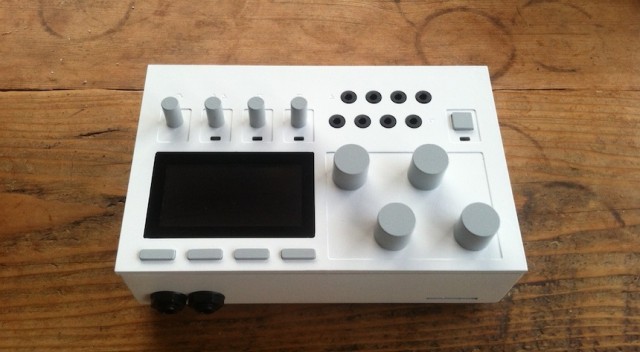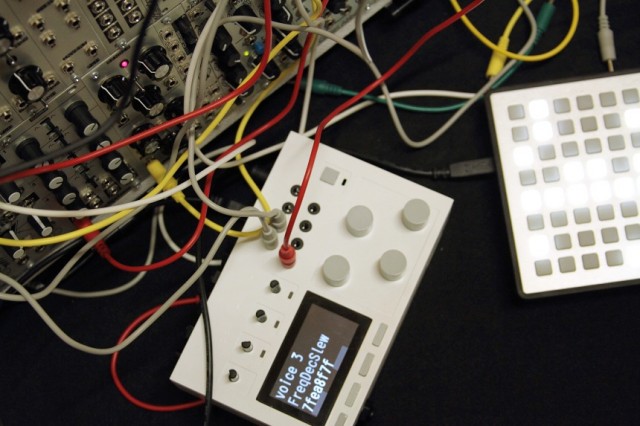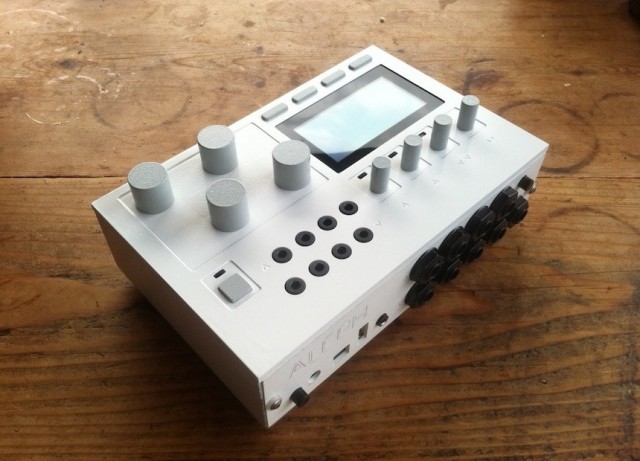monome, the iconic grid controller that launched them all, has always been a device tethered to a computer. Without a USB connection to your machine, it is an attractive but functionless box. The latest monome project, the result of a collaboration between Brian Crabtree and musician Ezra Buchla (yes, there’s a relation) is different. It is a computer, with all the functions that entails, but in a box designed for sound.
It has:
A brain: Two of them, in fact – a DSP chip (BF533 blackfin, 533 mHz with 64 MB SDRAM) and an AVR32 for control.
Audio connections: 4 in, 4 out balanced 192k/24-bit. The first two inputs can be switched to instrument gain.
A grayscale display: OLED, “beautifully low-res” (and thus sidestepping the problems that can come from supporting GUIs on Linux).
Analog control voltage: 4 in, 4 out CV on 3.55mm 0-10V connections, compatible with eurorack.
USB, expansion: Connect to a computer via USB, or host other USB devices – like the monome, natch, or any other class-compliant device (for HID or MIDI). There’s also an SD memory card slot and 1/4″ foot jacks. Curiously, there isn’t MIDI DIN, which seems unfortunate, though you can host one via the USB port. There’s also custom support planned for the Madrona Labs soundplane.
Controls: “Very high resolution” optical encoders.
And with this, you can do whatever you like. You can assign the encoders. You can assign and program the CV controls. You can run software to turn the box into a synth, or a sequencer, or an effects box, or a generative sound machine.
aleph prototype looper and drum synth from tehn on Vimeo.
But you know that – you’ve used computers before. aleph is notable because it’s the latest glimpse of how a “computer” in the near future may not be the general purpose device. In that sense, Steve Jobs’ term “post-PC” is absolutely fitting. And while the concept is nothing new, accessibility of these sorts of devices has gone up substantially, performance has gone up substantially, as costs have plummeted. This isn’t the first device to put a music computer in a box, but we’re now in an age when you would most want to use the result.
aleph itself is US$1400. That’s pricey by embedded computer standards, and would seem to leave the door open to a lower-cost competitor. As a dedicated music machine, though, it seems about right, in line with drum machines and so on that have vastly more limited functions and no re-programmability. (Well, not unless you’re Elektron.) It also seems a better investment of your $1400 than one of the larger monome controllers for the same price, in that the return is a self-contained box that can make sound. I also expect the aleph to follow in the footsteps of other monome projects, in both uncompromising hardware quality (made in no small part in the USA), and growing value from user-contributed software.
If you are a developer, you can make your own software in C; monome promises extensive documentation and even a ready-made disk image of the Linux toolchain so you don’t have to set it up yourself.
But you don’t need to be a programmer. Out of the box, aleph will ship with “a complex layered looper, a peculiar monosynth, and a sharp-enveloped drum synth to start, and our highly-flexible patchable control environment called bees.” (Peculiar, eh?)
bees is perhaps the most interesting of these, a “modular control environment” that will let you map the controls on the aleph and create your own instrumental, sequencing, effect, and control patches using modules, as well as manage these presets in performance.
aleph apparently isn’t open source hardware, but the bees software and USB interface are. And custom support is planned, too, for the strange and wonderful shnth, a similar DSP-in-a-box sound creation.
I’ll be interested to see how the Bluefin DSP chip performs; there are, of course, many other possible embedded approaches that could do this. But the approach, in case it isn’t already clear, is to build a high-performance box to replace a computer. From the FAQ:
we wanted a device that could provide a focused and customized dynamic control system for a complex live audio set-up; a way to integrate and manipulate devices quickly and dynamically without the hazards of an overburdened laptop running many software applications often at the mercy of a greedy operating system.
Shipping by the end of the year. Santa…?
Got questions about this? I hope we’ll interview Brian and Ezra (we’ve talked to Brian before, most recently about the arc). So we can pass those questions along.


